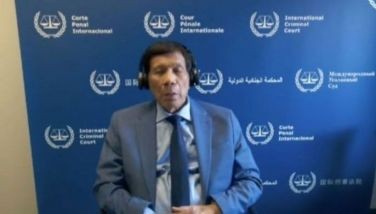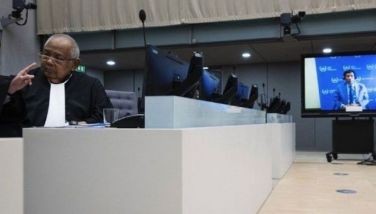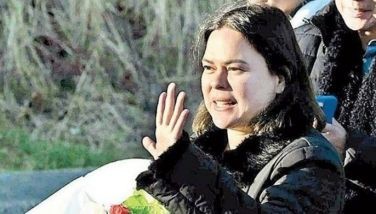A cop's lament

After 32 years in the service, Director General Jesus Verzosa hung up his uniform yesterday and turned over his badge and two service firearms: a .45 caliber automatic and a Magnum .44.
His white police service van, numbered 1001 with the words “Lead PNP” emblazoned on it, now belongs to his preferred successor, Deputy Director General Raul Bacalzo.
Verzosa had a special attachment to the Magnum .44, having used it in his first police operation wherein suspects were shot dead.
In his years as a constabulary officer, and then as a member of the Philippine National Police (PNP), Verzosa figured in operations wherein he counts some 200 suspects getting killed. He does not say how many of the fatalities were felled by his own gun. But he recalls the encounters to illustrate the hazards of police work.
The work is so “dangerous and frustrating,” says the country’s newly retired top cop, and a single mistake can destroy one’s career and reputation for good.
For those reasons, Verzosa dissuaded his only son Eric from following in his footsteps. The son, now 26, is instead studying medicine and plans to specialize in neurosurgery.
On the eve of his retirement, Verzosa talked to STAR editors about his career. There were rewarding moments, he recalled, particularly when he solved a brutal rape with homicide in Baguio City, with a nine-year-old girl suffering from cerebral palsy as the principal witness.
His proudest moment, he said, was when Antonio Sanchez, mayor of Calauan town in Laguna, was convicted in 1995 of raping and then murdering UP student Mary Eileen Sarmenta and her boyfriend Allan Gomez. Verzosa was assigned to take over the probe as Southern Tagalog regional head of the PNP Criminal Investigation Service (CIS) after Joseph Estrada, at the time vice president and chief crime buster, openly accused Kit Alqueza, the son of a police general, of being the mastermind of the gruesome crime.
For embarrassing the veep, Verzosa found himself assigned to the kangkungan, the swamp cabbage patch, during Erap’s short-lived presidency. In April 2001, Verzosa’s career took a 180-degree turn as he scaled a fence to serve the arrest warrant for plunder on ousted President Erap.
* * *
Verzosa’s reminiscence of his career is punctuated with laments about the intrusion of politics. His most frustrating moments in the service, he told us, were those when politicians and other influence peddlers meddled in police promotions, assignments and operations – his and those of other officers.
At least twice, he recalled, the intrusions stopped him from assuming command of the CIS, renamed the Criminal Investigation and Detection Group. In the first case the order for his assignment had been issued but was recalled and someone else installed. The second time, the order was withdrawn on the eve of turnover ceremonies. Again, another officer with the right connections assumed command.
As he went up the ranks, Verzosa said, politicians, representatives of religious organizations and other interest groups would phone him directly to lobby for promotions or assignments even of undeserving officers who do not meet the criteria set by PNP rules. If he put his foot down and said no, the lobbyists would go to his police superiors or the civilian leadership to get what they wanted.
Similar reasons must have once prompted another former PNP chief, Panfilo Lacson, to grouse in public that he hated politics and politicians. Lacson, now on the run for twin murders, eventually joined politics himself, although by most accounts he has been a maverick in the Senate, eschewing his annual P200-million pork barrel allocation.
Verzosa worked with Lacson in the Philippine Constabulary’s dreaded martial law-era anti-crime unit, the Metropolitan Command Intelligence Service Group (MISG).
He was a freshman at the University of the Philippines when Ferdinand Marcos was laying the groundwork for martial law, and he entered the Philippine Military Academy at the start of the dictatorship. Like most PMA graduates, Verzosa’s first assignment in 1976 was in a conflict zone, in Basilan and Maguindanao.
He remembers a mosque that was destroyed at the time in Matanog, Maguindanao. At the end of his police career, Verzosa is proud to announce that the mosque is being rebuilt with PNP support. He grins as he recalls being told by Muslim friends that this has assured him of a house with 72 bedrooms in the afterlife.
* * *
Several times in his career, Verzosa could have used sturdy shelter in a storm. When he assumed the top PNP post two years ago this month, he presented himself as a reform-minded chief, only to see the picture tainted by his wife’s participation in a trip to Russia by the so-called euro generals.
Verzosa also quit as head of the Intelligence Group to make way for a probe into the escape from the IG detention center at Camp Crame of Jemaah Islamiyah bomb maker Fathur Rohman al-Ghozi during the visit in Manila of Australian Prime Minister John Howard in July 2003. Al-Ghozi was shot dead in Mindanao three months later.
Verzosa’s assignment as PNP chief was only the third wherein he lasted two years; in all others, he stayed no more than a year.
The past year has been turbulent, with cataclysmic flooding spawned by Ondoy and Pepeng, followed by the Maguindanao massacre.
Verzosa blames feuding clans entering politics for much of the violence in Mindanao. He also admits that poorly paid cops are vulnerable to recruitment into the private armies of feuding clans. A single police escort service assignment at the height of the power of the Ampatuan clan, he recalled, could reportedly earn a cop up to P10,000.
Political pressure on the PNP was particularly strong during the last elections, when Verzosa openly said he would not follow an unlawful order from then President Gloria Macapagal-Arroyo. When Noynoy Aquino won, Verzosa vowed to tender his courtesy resignation, but P-Noy brushed it aside. Verzosa later opted for early retirement effective today (the turnover was yesterday).
Last Aug. 23, Verzosa flew to Cagayan de Oro upon the request of the military’s Benjamin Dolorfino to discuss security problems with roots in local politics.
That trip would cast a cloud over Verzosa’s career in its final days, as the public looked for someone to blame for the hostage fiasco. His career at least was drawing to a close. Other cops involved in the incident, however, are just beginning or in the prime of their careers.
One event, one mistake, Verzosa sighed, and a cop’s career is over.
- Latest
- Trending




























